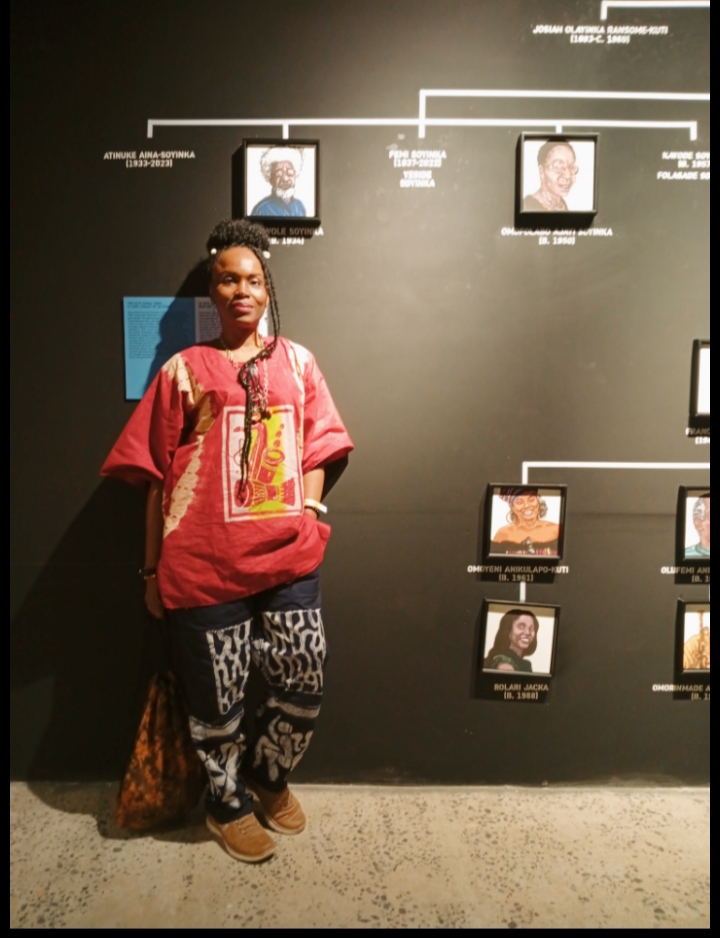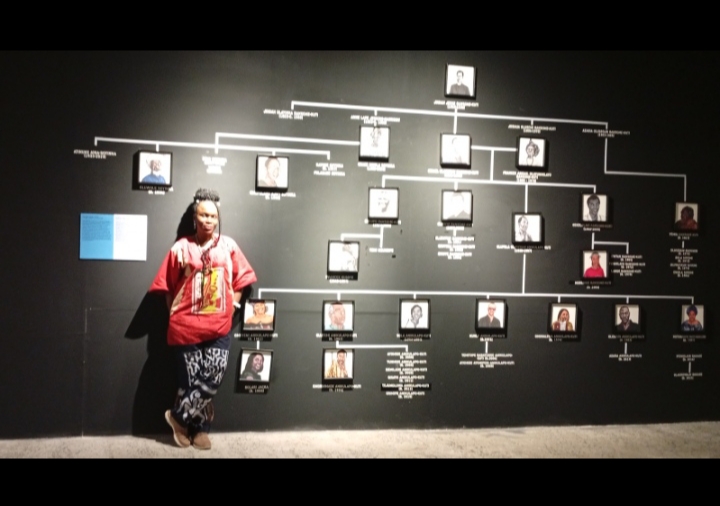From Oral Histories to Digital Archives: Reclaiming Our Genelogical Memories, Struggles and Stories
From oral lore to digital archives, a personal journey through Nigeria’s family trees reveals their power, nine historic challenges, and modern solutions.
By Ejiro Umukoro
Fela’s daughter, Yeni, is the brain behind #felabration when it was first conceived then brought to life. That singular decision, turned her father into another dimension of global influence, acceptance and emulation.
I’m standing here by the genealogy of Fela’s family tree. Ever since I was little, I’ve been fascinated by #FamilyTree.
Do you know your own family tree? If I ask you how far back can you trace yours, would you be able to name a family ancestor born in the 1800s?
Not many of us can even name who their grandfather or grandmother was, let alone a great grand or great great grand parents.
Isn’t that a shame?
Did you know that many of the tribes in Nigeria can trace their migrational histories up to 700 years? That’s a long time long before the British, Dutch and Portuguese invasion in the 1400s.
The Isokos, Urhobos, Igbos, Igalas, Yorubas, Nok, etc, can trace as far back as that. Yet, there’s hardly any documentation of these tribes’ history, not in oral form, that can be traced up to 3000 years, let alone 5,000 years like the Chinese. Still, there is evidence of a sort that shows beyond any doubt that these tribes migrated from somewhere else that can date back several thousands of years ago.
The tribe you know today as Isoko, Igbo, Bini, Efik, etc, are a story of mixed migration, intermarriages, forced cohabitation and other forms of human integration.

Why is our living roots important? I began a personal investigation to understand lineage tracing by observing varied Nigeria’s Family Trees.
Imagine a lantern’s soft glow spilling over weathered faces, the scent of kola nuts drifting on the evening air, and a circle of eager listeners hanging on every word. I stand before you, my voice a gentle drumbeat, ready to take you on a journey through the living, breathing power of a family tree—a tapestry that has anchored generations of Nigerians, even when history tried to uproot it.
When I first traced my own lineage, I felt like I’d opened a secret door into a world that existed long before I drew my first breath. My great‑grandmother a fiery and audaciously beautiful woman who beauty alone led to the death of her husband still echoes in my mind. I know her name, yet I can not speak it. Knowing that she survived the loss of a dear husband, hard times, religious persecution, etc., gave me a quiet strength I never knew I carried. A family tree is more than ink on paper; it is a map of love, loss, triumph, and tradition that tells us who we are, where we belong, and how we fit into the larger story of our people.
In many Nigerian homes, that map isn’t always neatly drawn. Those oral traditions—passed from elder to child like a sacred torch—are the lifeblood of our heritage. Yet never documented on paper.
Let me take down a path to show you the various factors that shape the Nigeria’s Family‑Tree landscape and our modern realities.
The first one is through Oral Tradition over Written Records. Much of our history lives in memory. While rich in storytelling, reliance on memory can lead to gaps or variations when names, dates, or relationships aren’t documented.
The invasion by the British, in particular and other disruptions from the Dutch and Portuguese Colonial was an era that introduced new naming systems, record‑keeping practices, and sometimes forced assimilation. Many family records were lost, altered, or never created, breaking the continuity of lineage.
Since kicking our the British, Dutch and Portuguese in 1960 to manage our affairs, a lack of Centralized Civil Registration especially in rural areas, births, marriages, and deaths weren’t always consistently recorded. Without official paperwork, tracing lineage beyond a few generations becomes a daunting task. We do not have a museum or library of Humans Born.
This conversation will not be complete if I do not mention the role of Polygamy & Large Extended Families. Polygamous households and extensive kin networks, while culturally significant, add layers of complexity. Mapping every sibling, step‑mother, and cousin can be overwhelming without meticulous records.
And what about our Cultural Naming Practices? Names can change due to rites of passage, marriage customs, or the use of nicknames. Different spellings or alterations over time obscure connections.
A huge factor in limited family tree history is limited access to education and record‑keeping tools. Historically low literacy rates meant many families didn’t keep personal journals or archives, relying instead on elders’ memories.
Let’s now talk about the Migration & Diaspora Disconnect. Large Nigerian diaspora communities mean families are spread across continents. Keeping track of relatives abroad, especially without digital tools, fragments family histories.
The civil wars (1967‑1970), military juntas, conflicts and Displacements have led to loss of documents, displacement of families, and broken links in generational memory.
And what about in the modern Digital age? There’s even a lot more digital gaps. While technology helps, not all families have equal access to digital tools for documenting or sharing family histories, widening the gap between those who can trace their lineage and those who cannot.
I have felt the sting of these gaps firsthand. Searching for a great‑ancestors birthdate, word of word did not do justice. I was looking for old ledgers from before 1960 to authenticate his existence but found none – a reminder of how the rule by invasion could erase as much as it recorded. Yet, every challenge has a counter‑move—a way we are stitching our tapestry back together.
It is time to reweave the threads. We must begin to have more documented Digital Genealogy Platforms. Genelogical tools Tools such as MyHeritage, and emerging Nigerian platforms can be further explored to allow us to upload oral histories, photos, and scanned documents. By digitizing these records, we create searchable archives that preserve stories for future generations.
We need more community Initiatives & Oral‑History Projects. Family reunions, heritage groups, and cultural festivals now serve as venues to collect oral narratives, photographs, and artifacts. Community-led workshops teach elders to record their stories on audio or video, ensuring they’re not lost.
More effort and support from Government & NGO Digitization in this era is also part of closing the gaps. Projects to digitize birth, marriage, and death certificates are underway, making vital records accessible online. Initiatives like the National Population Commission’s civil‑registration drives help fill the void left by missing paperwork.
At the heart of this conversation is more education and awareness. Schools and community centers can now include genealogy projects in their curricula. Young Nigerians interview elders, write family biographies, and create visual family trees. These activities instill pride in heritage and promote meticulous record‑keeping.
As life gets more comfortable, mobile Tech & Social Media are great tools for documentation, verification, authentication and more. WhatsApp groups, Facebook pages, and Instagram stories connect distant relatives instantly. A simple photo shared online can spark recognition of a long‑lost cousin in Lagos, London, or Lagos‑Texas. These platforms serve as modern “village squares” where family history is exchanged.
While at it, we can also explore cultural preservation programs where NGOs work with local chiefs and elders to document traditional naming ceremonies, marriage rites, and lineage oral chants. By preserving these cultural practices in written and digital form, we safeguard the context behind names and relationships.
What if we decide to turn this pursuit into a Professional Genealogical Services? That works just as fine, not so? This will create a business boom that’ll allow some families turn to Nigerian genealogists who specialize in tracing African lineages. The job of these experts is to navigate colonial archives, local registries, and oral testimonies to construct comprehensive family trees.
The Power of Knowing Our Roots can not be qualified nor taken for granted. What ties us more is often the undocumented histories of shared family trees. Knowing our roots gives us identity, a sense of belonging, and a reservoir of resilience. When I write a poem, I hear my great‑grandmother’s voice humming a lullaby; when I mentor a child, I channel the perseverance of ancestors who survived hardships I can scarcely imagine.
A well‑documented family tree also offers practical benefits: it helps secure inheritance rights, supports citizenship claims, and provides medical history crucial for health care. It connects us to networks of support, whether it’s a distant relative offering a job lead or a cousin sharing resources during a crisis.
Having walked with me up to this point, I hope you feel that same pulse of connection, that sense of belonging to something far larger than any one lifetime. Our ancestors didn’t just leave us stories; they left us a responsibility—to preserve, protect, and pass on the legacy.

If you have a family story waiting to be told, start by recording it—write it down, capture it on video, or share it online. Reach out to elders and ask about their childhoods, their parents, and the names that have shaped your lineage. Use the tools available—digital platforms, community groups, or local libraries—to safeguard those memories.
In the end, the power of a family tree lies not just in the names it records, but in the stories it awakens. It reminds us that we are threads woven into a grand tapestry—a tapestry that stretches across time, holding us together even when the loom of history rattles.
So, I ask you: what stories do your roots whisper? What songs will you add to the chorus of generations yet to come? ????✨ #trendingpost #trendingnow
Lady E Ejiro Umukoro
Multi Award Winning Author, Storyteller and Cultural Advocate





Comments